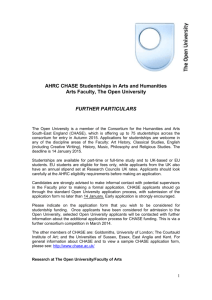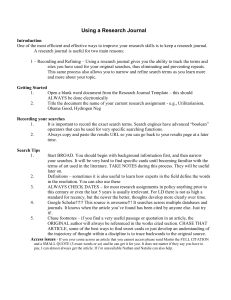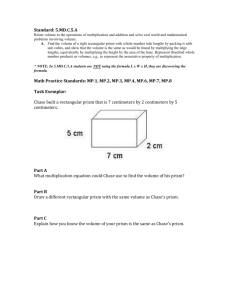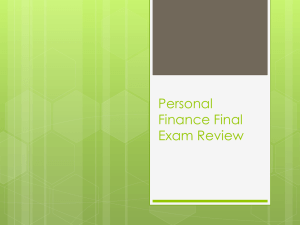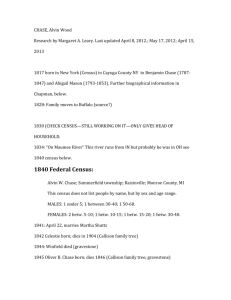Application Form - University of Sussex
advertisement
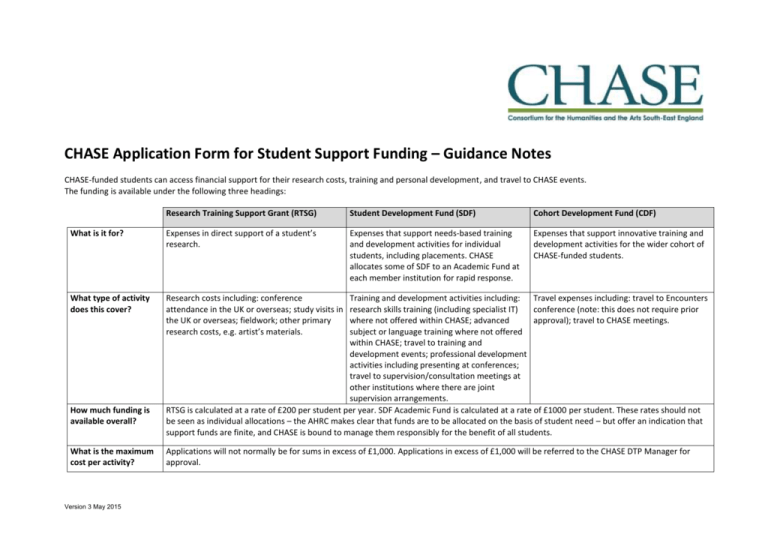
CHASE Application Form for Student Support Funding – Guidance Notes CHASE-funded students can access financial support for their research costs, training and personal development, and travel to CHASE events. The funding is available under the following three headings: Research Training Support Grant (RTSG) Student Development Fund (SDF) Cohort Development Fund (CDF) What is it for? Expenses in direct support of a student’s research. Expenses that support needs-based training and development activities for individual students, including placements. CHASE allocates some of SDF to an Academic Fund at each member institution for rapid response. Expenses that support innovative training and development activities for the wider cohort of CHASE-funded students. What type of activity does this cover? Research costs including: conference attendance in the UK or overseas; study visits in the UK or overseas; fieldwork; other primary research costs, e.g. artist’s materials. How much funding is available overall? What is the maximum cost per activity? Version 3 May 2015 Training and development activities including: Travel expenses including: travel to Encounters research skills training (including specialist IT) conference (note: this does not require prior where not offered within CHASE; advanced approval); travel to CHASE meetings. subject or language training where not offered within CHASE; travel to training and development events; professional development activities including presenting at conferences; travel to supervision/consultation meetings at other institutions where there are joint supervision arrangements. RTSG is calculated at a rate of £200 per student per year. SDF Academic Fund is calculated at a rate of £1000 per student. These rates should not be seen as individual allocations – the AHRC makes clear that funds are to be allocated on the basis of student need – but offer an indication that support funds are finite, and CHASE is bound to manage them responsibly for the benefit of all students. Applications will not normally be for sums in excess of £1,000. Applications in excess of £1,000 will be referred to the CHASE DTP Manager for approval. Can CHASE pay costs directly? Approved applications for large costs (e.g. training courses) of £250 and above may be paid directly by your institution. Smaller costs (e.g. domestic travel expenses) will be reimbursed on submission of an institutional expenses claim form. Can I travel First Class? Only standard class travel will be approved. How do I make the most of the funding? You are encouraged to consider your needs for support funding across your studentship at regular intervals (in the autumn each year, for instance) and to discuss them with your supervisor and local administrator, to ensure that CHASE can fully support your plans. The following two case studies offer possible scenarios for using CHASE student funding. They are intended to be illustrative rather than prescriptive, as each individual’s needs will be different: Case study 1: A project requires field research in central Asia. The research plan includes this field trip in the summer of the first year. CHASE provides £2,000 funding for the field trip as it is core to the research project, but due to its high cost, explains that there will be no further access to further funds for conference attendance. Case study 2: A project requires language training in Danish in the first year. Costs for this training are met by CHASE as essential for the individual student’s skills development. The cost of the training course is £500. The student plans from year one to attend a UK conference in their third year, and their expenses for attendance are met by CHASE. All applications for training and development This application form is not required for activities must be in response to an identified expenses relating to cohort training events or development need. CHASE uses the VITAE RDF Encounters conferences. planner tool to record development objectives and needs, so please consider this carefully and explicitly reference the planner in your application(s). Anything else I should know? How do I apply? Please complete all appropriate sections of the form and submit to your local administrator (see below). Please ensure that Sections 5 and 6 are complete before submission. If your expenditure is approved, please submit an Expenses Claim Form with receipts to your institutional CHASE administrator. Expenses claims must be accompanied by a short reflective report on the activity undertaken using the Support Funding Report form. Please note that CHASE administrators will allocate funding applications to the most appropriate fund heading. Who do I submit the form to? Please submit this form to your local administrator, or contact them with any queries: Courtauld Institute of Art: Ms Carla Bull, Records and Assessment Officer, carla.bull@courtauld.ac.uk Goldsmiths, University of London: Ms Lesley Hewings, Head of Graduate School Office, L.Hewings@gold.ac.uk Open University: Dr Caitlin Adams, Research & Enterprise Manager, Faculty of Arts, Arts-REST@open.ac.uk University of East Anglia: Mrs Annie Baker, CHASE Coordinator, Faculty of Arts & Humanities, humgrad.school@uea.ac.uk University of Essex: Ms Kay Wiggins, Executive Officer, kay.wiggins@essex.ac.uk University of Kent: Ms Ann Tull, Scholarships Office, A.E.Tull@kent.ac.uk copied to emsrcuk@kent.ac.uk University of Sussex: Ms Anna Izykowska, a.izykowska@sussex.ac.uk; Ms Julie Carr, Doctoral School Officer, j.l.carr@sussex.ac.uk; Version 3 May 2015 CHASE Application Form for Student Support Funding Section 1: Applicant Details Name: Student ID: Home Institution: Nature of Application, delete as appropriate: Research Cost/ Training & Development / Travel Expenses Date of Application: Section 2: Cost or Activity Details Description of cost or activity (please provide URL if possible): Date, if appropriate: For training & development activities only: With reference to the Vitae Researcher Development Framework, how does this support your professional development? Section 3: Detailed breakdown of expected costs Item/ Description Cost (£) Total estimated cost: Section 4: Supervisor Support Section 5: Institutional Approval Name: Date: Name: Date: Version 3 May 2015
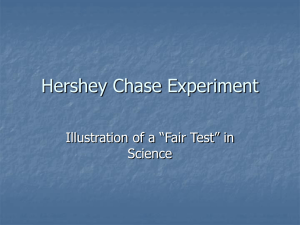

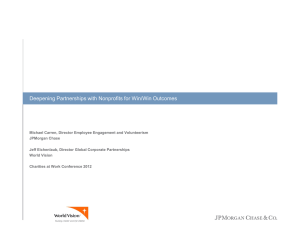
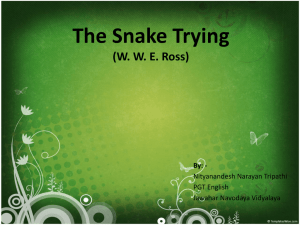
![[Real Estate Agent`s Letterhead]](http://s3.studylib.net/store/data/005885327_1-3dc7ad8d7e4c10c901ad78616807b37d-300x300.png)
